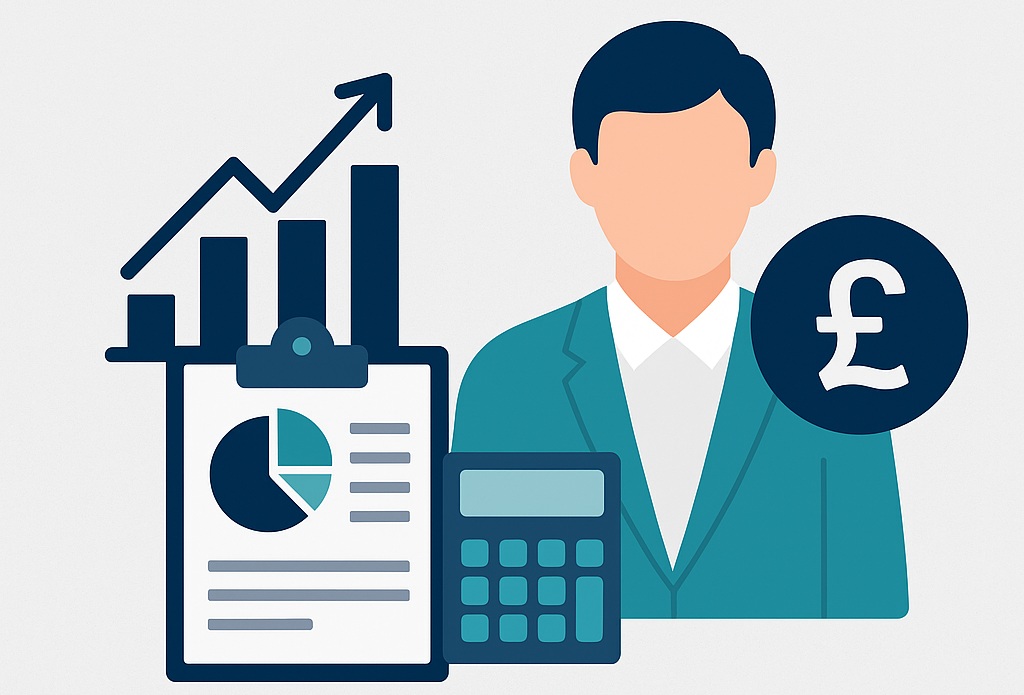Taxes are an inevitable expense of any small business, but not all tax bills are equal. The amount of small business tax to be paid differs, for instance, between a sole trader and a limited company.
Let’s take a look at the taxes that a small business can expect to encounter and which ones you might need to pay if you run a small business yourself.
How much tax does a small business pay in the UK?
Tax for a small business is unfortunately not a single lump sum sent through from HMRC every year. There are multiple fronts of tax that must be accounted for.
Income Tax
Income tax is the tax that most people are primarily familiar with. It’s what you pay as an individual on the amount you earn through work, such as salary, as well as other income like dividends.
Sole traders that fill out self-assessment tax returns will pay their income tax based on profits from their business. Company directors pay their income tax through their business’s PAYE.
Income tax is:
20% at the basic rate for incomes ranging from £12,571 to £50,270
40% at the higher rate for incomes ranging from £50,271 to £150,000
45% at the additional rate for incomes exceeding £150,000
National Insurance
A business with employees must pay their share of National Insurance contributions directly to HMRC.
Employees who earn less than the threshold of £9,568 per year (2021-2022) will not need to individually pay NIC.
National Insurance is 13.8% for employees earning greater than £9,568 per year. Businesses also need to pay the same amount on employee benefits and expenses.
Sole trader NICs vary depending on earnings:
- Profits of less than £6,515 require no National Insurance contributions
- Profits between £6,515 and £9,568 need Class 2 contributions, equalling £3.05 a week
- Profits between £9,568 and £50,270 require Class 4 contributions of 9%, plus the Class 2 rate
- Profits over £50,270 pay a Class 4 rate of 2% (offset by higher income tax)
Corporation Tax
Corporation tax is paid on the profits your business made during the financial year. It only applies to limited companies, and sole traders need not worry about this.
Corporation tax is set at 19% and must be paid on all profits made by a company. There is no personal allowance like with individual earnings and income tax. This tax is calculated after salaries and business expenses have been paid.
Value Added Tax (VAT)
VAT is a familiar tax that we all pay on a daily basis. For companies who are VAT-registered, the 20% tax must be added onto prices so that it is passed on to customers. Certain goods are subject to reduced rates, such as energy-saving materials like insulation and solar panels.
Unless a company’s taxable income exceeds the threshold at £85,000, companies don’t need to register for VAT. Being registered, however, does mean that businesses can reclaim VAT paid on any business expenses.
Dividend Tax
Company shareholders can pay themselves in dividends, with a tax-free allowance of £2,000.
Any amount higher than that requires paying dividend tax, but if dividends are the sole source of income then personal allowance can be used to take a higher amount before tax.
Dividend tax is charged at:
- 5% for the basic rate
- 5% for the higher rate
- 1% for the additional rate
Business Rates
Business rates are charged on the property from which a business is run, similar to council tax for domestic properties. They are charged by the local authority and calculated based on the estimated value of the property were it to go to sale.
Business rates typically apply to a property used only for business and that cannot be used domestically, such as a factory or purpose-built office. However, you can be charged business rates in certain circumstances if you run a business out of your home, such as if you’ve converted part of the house to serve the business.
There are other taxes that businesses can be liable for, such as capital gains tax if assets or the business itself is sold. Your SME might never encounter some of these taxes, whereas others will be very familiar.
Do small businesses pay corporation tax?
If a small business is a limited company, it must pay corporation tax.
It has to be paid nine months and one day after your accounting period concludes, and your annual accounts help HMRC understand how much you need to pay.
However, because your company tax returns are due twelve months from the end of your accounting date, it pays to send your returns early to make corporation tax more transparent.
The need to pay corporation tax will not be notified to you; businesses need to remember to pay their tax on time to avoid costly penalties.
Corporation tax will be far easier to manage and prepare for with tidy digital bookkeeping and regular, reliable accounts.
At what rate is a small business being taxed?
The rate of total small business tax depends on the taxes for which it’s liable. Some are flat rates, like corporation tax at 19% and NICs at 13.8% for eligible employees.
Other taxes like those outlined above depend on different thresholds and some may not even apply depending on the business entity itself. Retail SMEs will need to understand a totally different set of taxes to a sole trader electrician.
That’s why it’s important for any small business to seek the advice it needs to fully understand its obligations.
Understanding tax with Venn Accounts
We are Venn Accounts, an experienced team of chartered accountants who deliver a bespoke service to each of our customers.
Venn Accounts use cloud-based software to handle your accounts, tax returns, bookkeeping, and more, acting as an extension of your business.
Most importantly, Venn Accounts understands small business tax and can explain anything you require in clear, plain language.
To learn more about our tried and trusted services, please contact us today. We are here to help and are happy to answer any questions you might have.





